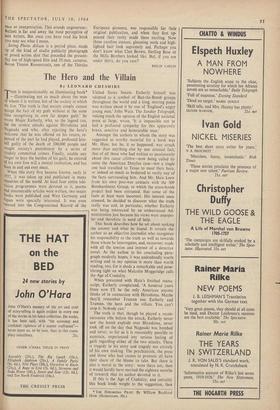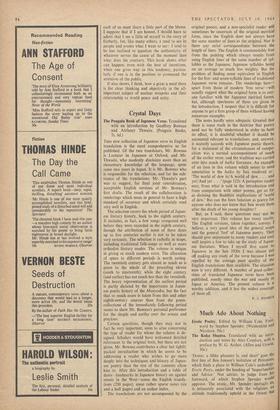The Hero and the Villain
By LEONARD CHESHIRE
THIS is unquestionably an illuminating book* —illuminating not so much about the man of whom it is written, but of the society in which We live. The truth is that society simply cannot accept the fact of my guilt without at the same time recognising its own far deeper guilt.' So Wrote Major Eatherly, who, so the legend ran, led the atomic attacks against Hiroshima and Nagasaki and who, after rejecting the hero's Welcome that he was offered on his return, re- pented of the part he had played, professed him- self guilty of the death of 100,000 people and sought society's punishment by a series of Crudely committed crimes. Finally, unable any longer to bear the burden of his guilt, he entered of his own free will a mental institution, and has been in and out ever since.
When this story first became known, early in 1957, it was taken up and publicised in many Countries of the world. At least four entire tele- vision programmes were devoted to it, poems and innumerable articles were written, two major books were published and West Germany and Japan were specially interested. It was even entered into the Congressional Record of the United States Senate. Eatherly himself was adopted as a symbol of Ban-the-Bomb groups throughout the world and a long, moving poem was written about it by one of 'England's angry young men,' John Wain. The Sunday Telegraph, voicing much the opinion of the English national press at large, wrote, 'It is impossible not to feel a profound sympathy for this apparently brave, sensitive and honourable man.'
Amongst the authors to whom the story was suggested as worthy material for a book was Mr. Huie, but he, it so happened, was struck more than anything else by one unusual fact, that of all those who had written so passionately about this cause célèbre—now being called by some the American Dreyfus case—not a single one had travelled to Texas to meet their hero, or indeed so much as bothered to verify any of the facts surrounding him. And Mr. Huie knew from his own post-war contacts with the 509 Bombardment Group, to which the atom-bomb project had been entrusted, that some of the facts at least were incorrect. His interest once aroused, he decided to discover what the truth really was and, in particular, whether Eatherly was being mistreated by an embarrassed Ad- ministration just because his views were unpopu- lar and therefore in need of help.
This book describes how he set about seeking the answer and what he found. It reveals the author as an objective journalist who recognises his responsibility to the truth as well as towards those whom he interrogates, and, moreover, reads with all the tension and interest of a detective novel. As the author in his concluding para- graph modestly hopes, it was undoubtedly worth writing and in my opinion is more than worth reading, too, for it sheds a remarkable and pene- tfating light on what Malcolm Muggeridge calls the Age of Credulity.
When presented with Huie's finished manu- script, Eatherly complained, 'A hundred years from now I'll be the only American anyone thinks of in connection with Hiroshima. Maybe they'll remember Truman too. Eatherly and Truman, the hero and the villain. You can't stop it. Nobody can.'
The truth is that, though he played a recon- naissance role before the attack, Eatherly never saw the bomb explode over Hiroshima, never took off on the day that Nagasaki was bombed and never, so far as it is reasonably possible to ascertain, experienced any serious feeling of guilt regarding either of the two attacks. There is tragedy in his story and tragedy not entirely of his own making. The psychiatrists, the press and those who had causes to promote all have their share of the blame to take. But there is also a moral in the story: were there not, then it would hardly have merited the eighteen months of research that its author devoted to it.
If this is the Age of Credulity, and certainly this book lends weight to the suggestion,. then
*THE HIROSHIMA PILOT. By William Bradford Huie. (Heinemann, 30s.)
each of us must share a little part of the blame. I suppose that if I am honest, I should have to admit that I see a little of myself in the story of Eatherly, for, like many others, I tend to see in people and events what I want to see: I tend to be less inclined to question the authenticity of whatever serves the cause of the moment then what does the contrary. This book shows what can happen, even with the best of intentions, when one gives way to this tendency, particu- larly if one is in the position to command the attention of the public.
It also shows, I think, how a great a need there is for clear thinking and objectivity in the all- important subject of nuclear weapons and their relationship to world peace and unity.











































 Previous page
Previous page